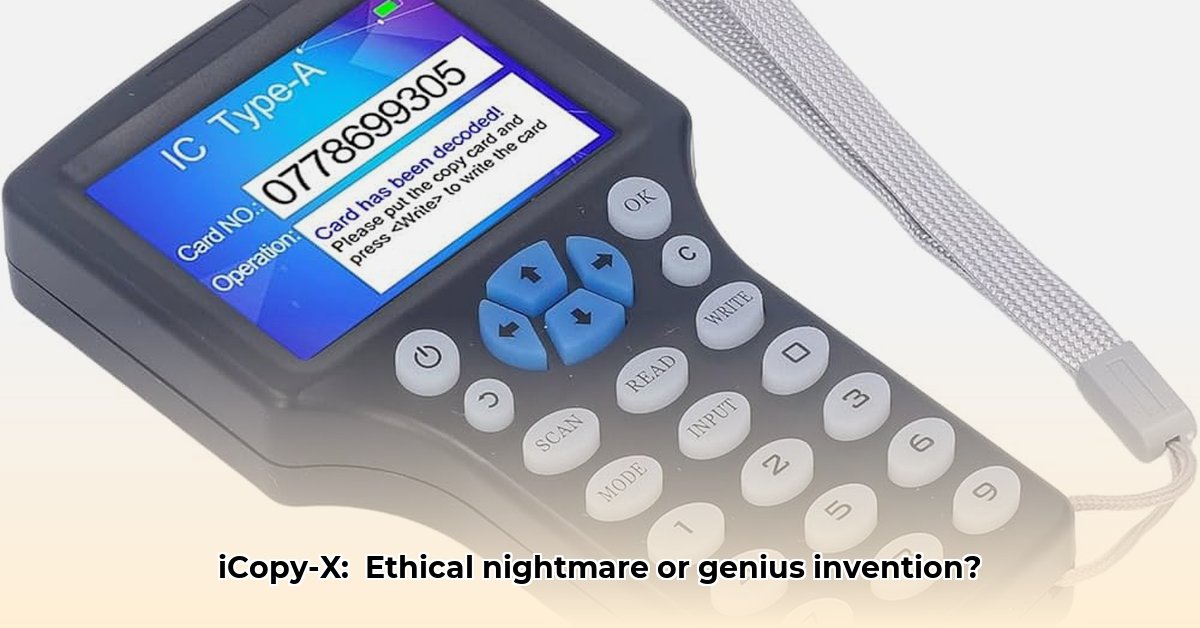
Technical Review of iCopy-X
The iCopy-X, based on the Proxmark3 platform, is a device capable of cloning RFID cards. Its advertised "Auto Copy" feature simplifies the cloning process, making it appealing to various user groups. Its portability and relatively compact size further enhance its practicality. However, the iCopy-X is not a universal solution. Many modern security systems, particularly those employing advanced anti-copying algorithms prevalent in Europe, pose significant challenges to the iCopy-X's functionality. The device's effectiveness varies significantly depending on the target RFID card's security protocols and firmware versions. While commands like hf iclass loclass, hf mf chk, hf mf wrbl, hf iclass wrbl, hf iclass sim, and hf mf sim illustrate its capabilities, success is not guaranteed, highlighting the ongoing "arms race" between cloning technology and security measures.
Strengths: Ease of use (for supported cards), portability, relatively low cost.
Weaknesses: Ineffective against advanced anti-copy algorithms, potential for misuse, limited functionality with certain security protocols.
Market Analysis of RFID Cloning Devices
The market for RFID cloning devices, as evidenced by readily available online searches for terms like "HID card duplicators," demonstrates considerable interest and a potentially growing market. This market segmentation includes security professionals (legitimate penetration testing, vulnerability assessments), locksmiths (limited specialized applications), and hobbyists (varying purposes, ranging from experimentation to potentially illicit activities). The cost of the device and blank RFID cards is a factor, but the open-source nature of underlying technologies like Proxmark3 is a significant driver of continuous development and innovation, often outpacing updates in security measures. Market growth will likely depend on technological advancements and the evolving regulatory landscape.
Ethical and Legal Implications of RFID Cloning
RFID cloning technology presents significant ethical dilemmas. While legitimate uses exist (e.g., security audits), the potential for misuse, notably in identity theft and unauthorized access, is substantial. The ease of use of devices like the iCopy-X further exacerbates these concerns. Existing regulations, such as GDPR and CCPA (in certain regions), address data protection; however, the legal landscape surrounding RFID cloning remains somewhat ambiguous and requires further clarification and enforcement. Stronger penalties for illegal use and a clear framework for responsible use are necessary to mitigate potential harm. How do we balance the benefits of innovation with the prevention of widespread misuse?
Risk Assessment and Mitigation Strategies
The iCopy-X, and RFID cloning technology in general, poses risks across several domains: identity theft, financial fraud, and unauthorized access. The effectiveness of mitigation strategies depends heavily on the specific implementation and security measures in place. Key mitigation strategies include:
- Software Updates: Regular updates patch vulnerabilities and reduce the likelihood of malicious exploitation.
- Thorough Testing: Rigorous testing of security measures is essential to identify and address weaknesses.
- Robust Legal Frameworks: Clearer laws and penalties are needed to deter illegal activities.
- Public Awareness: Educating individuals about the risks and vulnerabilities associated with RFID technology is crucial.
- Implementing Advanced Anti-Clone Measures: Utilizing encryption and other advanced security algorithms.
Conclusion
The iCopy-X exemplifies the complex interplay between technological innovation and ethical concerns. While offering legitimate applications in security auditing, its potential for misuse underscores the need for responsible development, clear regulations, and robust mitigation strategies. The future of RFID security rests on a delicate balance between technological advancement and the prevention of malicious use. Continued research and development of advanced anti-cloning technologies are crucial in navigating this ethical tightrope. The question of how to effectively balance innovation with responsible use remains a critical challenge.
⭐⭐⭐⭐☆ (4.8)
Download via Link 1
Download via Link 2
Last updated: Monday, May 05, 2025